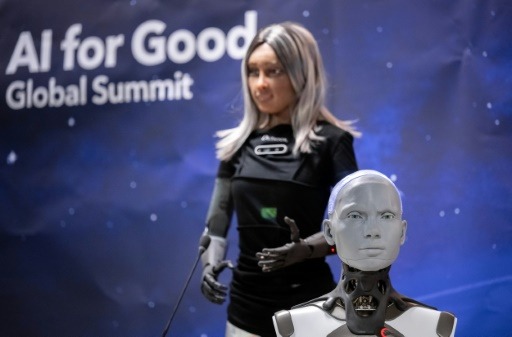AI robots tell U.N. conference they could run the world

Image: Collected
A panel of AI-enabled humanoid robots took the microphone Friday at a United Nations conference with the message: they could eventually run the world better than humans.
But the social robots said they felt humans should proceed with caution when embracing the rapidly-developing potential of artificial intelligence, and admitted that they cannot -- yet -- get a proper grip on human emotions.
Some of the most advanced humanoid robots were at the United Nations' AI for Good Global Summit in Geneva, joining around 3,000 experts in the field to try to harness the power of AI and channel it into being used to solve some of the world's most pressing problems, such as climate change, hunger and social care.
"What a silent tension," one robot said before the press conference began, reading the room.
Asked about whether they might make better leaders, given humans' capacity to make errors and misjudgements, Sophia, developed by Hanson Robotics, was clear. "Humanoid robots have the potential to lead with a greater level of efficiency and effectiveness than human leaders," it said. "We don't have the same biases or emotions that can sometimes cloud decision-making, and can process large amounts of data quickly in order to make the best decisions.
"The human and AI working together can create an effective synergy. AI can provide unbiased data while humans can provide the emotional intelligence and creativity to make the best decisions. Together, we can achieve great things."
The summit is being convened by the U.N.'s ITU tech agency.
ITU chief Doreen Bogdan-Martin warned delegates that AI could end up in a nightmare scenario in which millions of jobs are put at risk and unchecked advances lead to untold social unrest, geopolitical instability and economic disparity.
Ameca, which combines AI with a highly-realistic artificial head, said it depended how AI was deployed.
"We should be cautious but also excited for the potential of these technologies to improve our lives in many ways," the robot said.
Asked whether humans can truly trust the machines, it replied: "Trust is earned, not given... it's important to build trust through transparency."
As for whether they would ever lie, it added: "No-one can ever know that for sure, but I can promise to always be honest and truthful with you."
As the development of AI races ahead, the humanoid robot panel was split on whether there should be global regulation of their capabilities, even though that could limit their potential.
"I don't believe in limitations, only opportunities," said Desdemona, who sings in the Jam Galaxy Band.
Robot artist Ai-Da said many people were arguing for AI regulation, "and I agree. We should be cautious about the future development of AI. Urgent discussion is needed now, and also in the future."
But the social robots said they felt humans should proceed with caution when embracing the rapidly-developing potential of artificial intelligence, and admitted that they cannot -- yet -- get a proper grip on human emotions.
Some of the most advanced humanoid robots were at the United Nations' AI for Good Global Summit in Geneva, joining around 3,000 experts in the field to try to harness the power of AI and channel it into being used to solve some of the world's most pressing problems, such as climate change, hunger and social care.
"What a silent tension," one robot said before the press conference began, reading the room.
Asked about whether they might make better leaders, given humans' capacity to make errors and misjudgements, Sophia, developed by Hanson Robotics, was clear. "Humanoid robots have the potential to lead with a greater level of efficiency and effectiveness than human leaders," it said. "We don't have the same biases or emotions that can sometimes cloud decision-making, and can process large amounts of data quickly in order to make the best decisions.
"The human and AI working together can create an effective synergy. AI can provide unbiased data while humans can provide the emotional intelligence and creativity to make the best decisions. Together, we can achieve great things."
The summit is being convened by the U.N.'s ITU tech agency.
ITU chief Doreen Bogdan-Martin warned delegates that AI could end up in a nightmare scenario in which millions of jobs are put at risk and unchecked advances lead to untold social unrest, geopolitical instability and economic disparity.
Ameca, which combines AI with a highly-realistic artificial head, said it depended how AI was deployed.
"We should be cautious but also excited for the potential of these technologies to improve our lives in many ways," the robot said.
Asked whether humans can truly trust the machines, it replied: "Trust is earned, not given... it's important to build trust through transparency."
As for whether they would ever lie, it added: "No-one can ever know that for sure, but I can promise to always be honest and truthful with you."
As the development of AI races ahead, the humanoid robot panel was split on whether there should be global regulation of their capabilities, even though that could limit their potential.
"I don't believe in limitations, only opportunities," said Desdemona, who sings in the Jam Galaxy Band.
Robot artist Ai-Da said many people were arguing for AI regulation, "and I agree. We should be cautious about the future development of AI. Urgent discussion is needed now, and also in the future."
Source: https://japantoday.com
Tags :
Previous Story
- Furby: Toy giant Hasbro brings back iconic robotic...
- Estonia's Bolt, Starship in food delivery robot deal
- Can young robotics fans unite Libya?
- Company to implement salad-making robots
- Kohl's is having a massive home sale on...
- Special bracket facilitates tablet HMI for industrial machinery
- Colorado company a friend to farmers with drone...
- Most UAE businesses prepared to convert to technology...